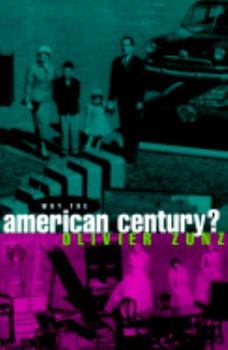Why the American Century?
Select Format
Select Condition 
Book Overview
Reinterpreting our country's rise to world power, Olivier Zunz shows how American elites appropriated the twentieth century. Policymakers, corporate managers, engineers, scientists, and social scientists promoted a social contract of abundance and a controversial theory of pluralism. Their efforts created a model of middle class behavior for America and for the rest of the world. "It should certainly be the task of historians to explain the...
Format:Paperback
Language:English
ISBN:0226994627
ISBN13:9780226994628
Release Date:June 2000
Publisher:University of Chicago Press
Length:270 Pages
Weight:0.85 lbs.
Dimensions:0.6" x 6.0" x 9.0"
Customer Reviews
1 rating
Is America really unique?
Published by Thriftbooks.com User , 14 years ago
In this short but introspective work, Olivier Zunz explores how the United States had flourished during the twentieth century and its influence on the rest of the world. Why the American Century, "carefully separates the American century, a social and economic phenomenon, from the `Pax Americana,' the global outcome of American intervention in the rest of the world." Olivier Zunz is currently a Commonwealth Professor at the University of Virginia, was educated in France and has written several books and numerous articles on the economic and social issues of America and its influence on the world. Borrowing upon the ideas of Henry Luce who, months before Pearl Harbor in 1941, wrote an editorial in Life attempting to persuade the American people to join the war effort as they were critically important in both military might and world opinion. "The `American century' was founded on Americans' increasingly sophisticated ability to turn knowledge of the physical world into market and military advantages, thus challenging Europeans' economics, scientific, and technological leadership" (p. 4). Powerful words and descriptions of the United States are used by Zunz throughout and he appears extremely insightful into both the past and the future of the nation, even after the book's publishing date. "America's potential for global leadership as a creative opportunity for his countryman to secure their domestic achievements by exporting democratic principles throughout the world," he maintains is important and "however tempting it may have been previously to remain aloof, Americans could no longer afford their splendid isolation" (p. ix). Simply, Zunz claimed America needed the world and the world needed America. By itself, the United States would not have become what it had in the 20th century and experienced a remarkably distinctive transformation of science and industry and the resulting reorganization of society. Why the American Century is divided into four different sections. The first two are primarily economic, the last two are social in nature, and the ideas of each relate to one another but all carry their own theme. All sections are extremely well documented and researched offering endnotes and statistics throughout. In the first section, Zunz offers insight into America's academia and how its flexibility in both funding and research facilities stimulated production by meshing graduates with industry during the early-mid twentieth century. This relationship was unlike any other developed country in that research facilities and those who posted them may be in industrialized cities but a connection between the two was not established and, "consequently, Americans unleashed an unprecedented level of creative energy among partners who were producers, brokers, and users of knowledge" (p. 7). The second section deals with a new form of consumer seen in America and the psychology behind this new thinking. "In the nineteenth century, American





